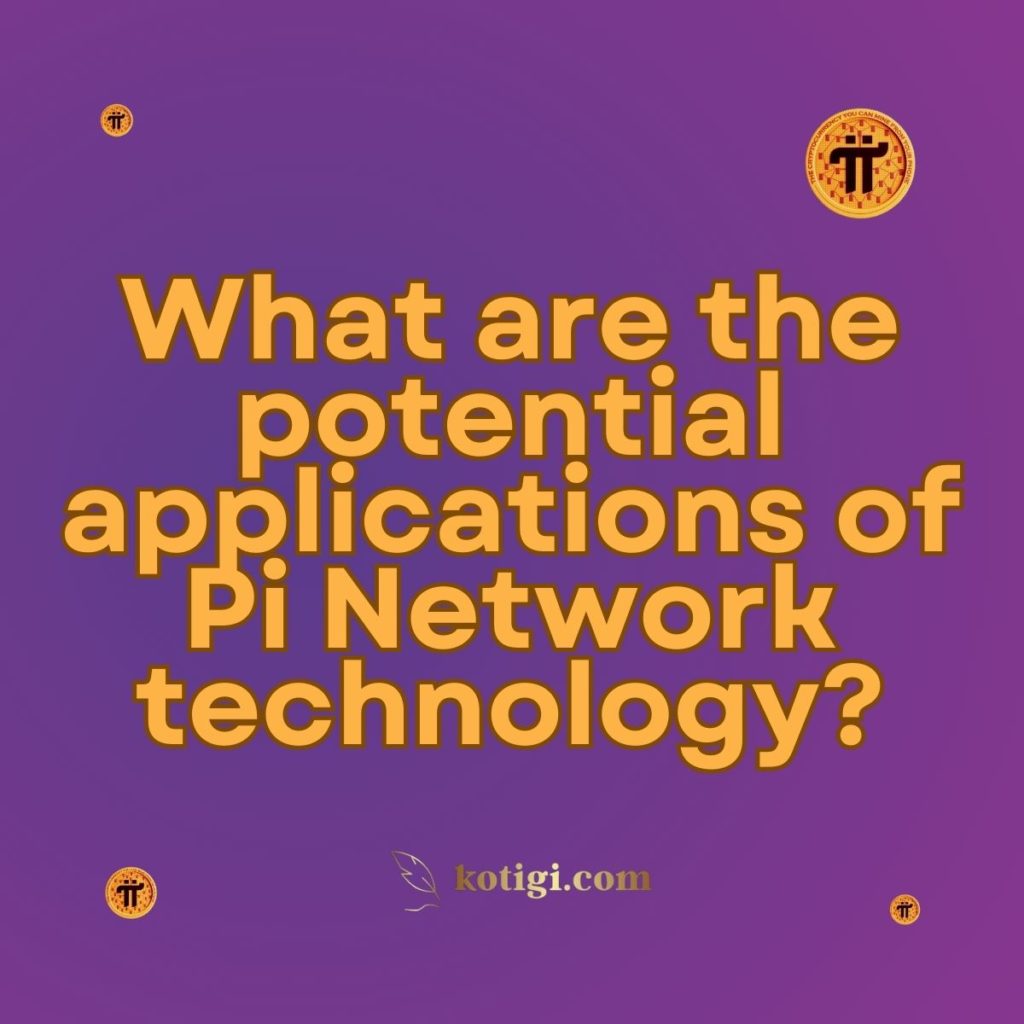
What are the potential applications of Pi Network technology?
The Pi Network’s technology enables a variety of applications, including decentralized finance (DeFi), payment solutions, social platforms, gaming, peer-to-peer marketplaces, and identity verification. With its user-friendly mobile infrastructure and scalable blockchain, Pi has the potential to support digital economies, community governance models, and dApp development across multiple industries.
Introduction
Pi Network has quickly gained popularity due to its mission to democratize access to cryptocurrencies through mobile mining. As it continues to evolve, Pi’s blockchain technology promises to unlock diverse applications across multiple sectors. Beyond simply being a cryptocurrency for transactions, Pi Network’s architecture enables innovations in decentralized finance (DeFi), social interactions, payments, e-commerce, and governance. The combination of a lightweight consensus mechanism, user-friendly ecosystem, and accessible infrastructure allows Pi to cater to a wide range of use cases for both businesses and individuals.
This post explores the potential applications of Pi Network technology, detailing how the network’s features can impact industries such as finance, gaming, governance, and more. It will also highlight the advantages of using Pi over traditional blockchain solutions and describe the future possibilities for developers and users within the Pi ecosystem.
Decentralized Finance (DeFi) Solutions
Peer-to-Peer Lending
Pi Network can serve as a platform for peer-to-peer lending services, where users lend and borrow funds without traditional financial intermediaries. Pi tokens can be used as collateral to access loans, fostering a decentralized credit system.
Savings and Staking Opportunities
Users could stake Pi tokens to earn rewards, participating in liquidity pools or savings programs. This would encourage user engagement while offering financial benefits through interest on staked assets.
Decentralized Exchanges (DEXs)
Pi Network’s blockchain infrastructure can support decentralized exchanges (DEXs), where users trade Pi tokens or other digital assets directly without intermediaries. This aligns with Pi’s ethos of empowering individuals through decentralized systems.
Microfinance Platforms
Given the low barrier to entry on Pi, the network can host microfinance platforms that extend small loans to users in need. These platforms could be particularly beneficial in underbanked regions, where access to traditional financial services is limited.
Payment Systems and E-Commerce
Mobile-Based Payment Solutions
Pi Network’s mobile-first design makes it an ideal platform for peer-to-peer payments. Users can send Pi tokens directly through the Pi app for remittances, online purchases, or in-person transactions.
Merchant Acceptance for Pi Tokens
Merchants can integrate Pi Network as a payment option for goods and services, offering a frictionless way to conduct transactions without needing credit card infrastructure or fiat payments.
Cross-Border Transactions
Pi’s blockchain infrastructure enables seamless cross-border transactions without the need for currency conversions or high fees. This is especially valuable in regions where traditional banking is expensive or unavailable.
In-App Purchases for Digital Platforms
Developers could use Pi tokens as currency for in-app purchases, whether in games, media platforms, or online services. This application would enhance the Pi ecosystem and introduce more use cases for the currency.
Social Platforms and Community Governance
Decentralized Social Media Platforms
Pi Network’s technology can power decentralized social media platforms, where user data remains private and content is governed by community rules rather than centralized entities. Users could earn Pi tokens for content creation or engagement.
Community Governance and DAOs
Pi Network offers opportunities for Decentralized Autonomous Organizations (DAOs) where users participate in governance through voting and decision-making. These DAOs could govern community projects, charities, or decentralized businesses.
Social Rewards and Incentives
Users can earn Pi tokens for participating in community-driven activities, such as hosting events, contributing to forums, or providing peer support. This model incentivizes participation and strengthens community bonds.
Content Monetization Platforms
Bloggers, vloggers, and influencers could use Pi to receive tips or payments for their content. This would create a more direct connection between creators and consumers, reducing reliance on ad-driven revenue models.
Gaming and Virtual Economies
Blockchain-Based Games
Pi Network can serve as a foundation for blockchain-based games, allowing developers to create immersive virtual experiences where users earn Pi tokens through gameplay.
Tokenized Assets in Games
In-game assets can be tokenized as NFTs (non-fungible tokens) on Pi’s blockchain, enabling players to trade or sell these items across different platforms.
Virtual Economies and Marketplaces
Pi tokens can be used to power virtual economies in online worlds, where users buy and sell virtual real estate, clothing, or collectibles. These economies would be fueled by Pi’s blockchain, offering transparency and security.
Play-to-Earn (P2E) Models
With Pi tokens as in-game rewards, the network could support play-to-earn models, where users earn cryptocurrency by participating in games. This model democratizes access to earnings for gamers worldwide.
Identity Verification and Authentication
Digital Identity Solutions
Pi Network can host digital identity verification systems, providing secure authentication without relying on centralized databases. Users control their own data, ensuring privacy and security.
KYC Verification for dApps
Developers can leverage Pi’s KYC (Know Your Customer) system to authenticate users for decentralized applications. This ensures compliance with regulations while maintaining decentralization principles.
Secure Voting Systems
Pi Network’s blockchain can enable secure and transparent voting systems, whether for community governance or national elections. Users would verify their identities through the network, ensuring the integrity of votes.
Authentication for Online Services
Pi tokens can be used as credentials to access online services, replacing traditional login methods with blockchain-based authentication for increased security.
Developer Ecosystem and dApp Innovation
Support for Decentralized Applications (dApps)
Pi Network provides developers with the tools and resources to build dApps on its blockchain. These applications could cover a wide range of industries, from finance to social platforms.
Open Source Collaboration
The network promotes open-source development, encouraging collaboration between developers to create innovative solutions. This approach fosters continuous improvement and rapid innovation within the ecosystem.
Incubation Programs for Startups
Pi Network can introduce incubation programs that support startups building on its blockchain. These programs would provide funding, mentorship, and resources to entrepreneurs developing scalable solutions.
Developer Bounties and Hackathons
The Core Team can host developer bounties and hackathons, encouraging developers to build impactful dApps. Successful projects could receive Pi tokens or additional support to scale their applications.
Healthcare and Education Applications
Blockchain in Healthcare
Pi Network’s blockchain could store medical records securely, allowing patients and healthcare providers to access data transparently and efficiently. The technology ensures data integrity and privacy while reducing administrative overhead.
Educational Platforms and Certifications
Educational institutions could issue blockchain-based certificates on Pi’s network, preventing credential fraud and ensuring authenticity. Pi tokens could also be used for tuition payments or course fees.
Crowdsourced Healthcare Funding
The network could host decentralized crowdfunding platforms for healthcare needs, where users contribute Pi tokens to fund medical treatments or research projects.
Incentivizing Learning and Skill Development
Educational apps can reward users with Pi tokens for completing courses or acquiring new skills, promoting lifelong learning within the ecosystem.
Conclusion
The potential applications of Pi Network technology extend beyond simple cryptocurrency transactions. With a focus on accessibility, decentralization, and user engagement, Pi Network can power solutions in finance, gaming, social platforms, healthcare, and education. Its innovative architecture and developer-friendly ecosystem provide the foundation for dApp development and real-world applications. As Pi continues to evolve, its ability to adapt to different industries and use cases will be critical in driving mass adoption and establishing it as a key player in the blockchain space.
Key Takeaways
- DeFi Solutions: Pi Network supports peer-to-peer lending, savings, staking, and decentralized exchanges.
- Payment Systems: Pi tokens can be used for cross-border transactions, merchant payments, and in-app purchases.
- Social Platforms: Decentralized social media and community governance models thrive on Pi’s infrastructure.
- Gaming Applications: Pi powers blockchain-based games, tokenized assets, and play-to-earn models.
- Identity Verification: Pi Network offers secure KYC solutions, voting systems, and digital identity tools.
- dApp Development: The network fosters innovation with developer tools, bounties, and incubation programs.
- Healthcare and Education: Blockchain in healthcare and education enables secure data storage and verified certifications.
- Scalable Ecosystem: Pi’s technology ensures continuous growth and adaptability across industries.





